In Ma’arrat An Nu’man, restored health services give families both dignity and stability
 Dr Jaber Al-Omar examines a young patient at Ma’arrat An Nu’man public health centre which now records more than 1,200 paediatric visits each month. Photo credit: WHO18 September 2025, Idlib, Syrian Arab Republic – After years of disruption, the Ma’arrat An Nu’man Primary Health Centre has been steadily rebuilding itself as a central point of care for thousands of families returning to their city. For people who endured years of conflict and displacement, the Centre is more than a building – it is a sign of stability.
Dr Jaber Al-Omar examines a young patient at Ma’arrat An Nu’man public health centre which now records more than 1,200 paediatric visits each month. Photo credit: WHO18 September 2025, Idlib, Syrian Arab Republic – After years of disruption, the Ma’arrat An Nu’man Primary Health Centre has been steadily rebuilding itself as a central point of care for thousands of families returning to their city. For people who endured years of conflict and displacement, the Centre is more than a building – it is a sign of stability.
Among the health workers anchoring this recovery is Dr Jaber Al-Omar, a paediatrician who now treats more than 1200 children each month. “Many of the children I see are malnourished or suffer from recurring infections,” he explained. “But what families need most is reassurance – to know that care is available close to home.” His calm presence has earned the trust of parents, who say his work gives them both hope and confidence.
At the pharmacy, Saddam Al-Abbas manages the supply of essential medicines with meticulous care. In one recent emergency, when a child arrived struggling to breathe, Saddam drew from a reserve stock he had set aside for such moments, ensuring the boy received immediate treatment. “In these conditions, medicine is not just about healing,” he said. “It is about survival – making sure no one is left without what they need at the right time.”
Meeting overwhelming demand
 Pharmacist Saddam Al-Abbas prepares essential medicines for patients, ensuring continuity of treatment even during emergencies. Photo credit: WHOSince reopening in May 2025, the centre has been overwhelmed by demand. In its first week alone, more than 1800 consultations were carried out. The emergency unit managed over 600 urgent cases, while the midwifery team supported more than 300 women.
Pharmacist Saddam Al-Abbas prepares essential medicines for patients, ensuring continuity of treatment even during emergencies. Photo credit: WHOSince reopening in May 2025, the centre has been overwhelmed by demand. In its first week alone, more than 1800 consultations were carried out. The emergency unit managed over 600 urgent cases, while the midwifery team supported more than 300 women.
“Sometimes I feel the number of patients will never end,” said Ahlam, a midwife at the centre. “But I remind myself that every mother we care for safely, every child we vaccinate, is part of rebuilding this community.”
Supported with trained staff and a stocked pharmacy, the health centre has exceeded projections while maintaining safe consultation loads in line with international standards. A 10-bed emergency unit functions around the clock to stabilize trauma and obstetric emergencies, while referral protocols and two dedicated ambulances ensure that critical patients reach hospitals in Idlib within two hours.
Caring for the whole person
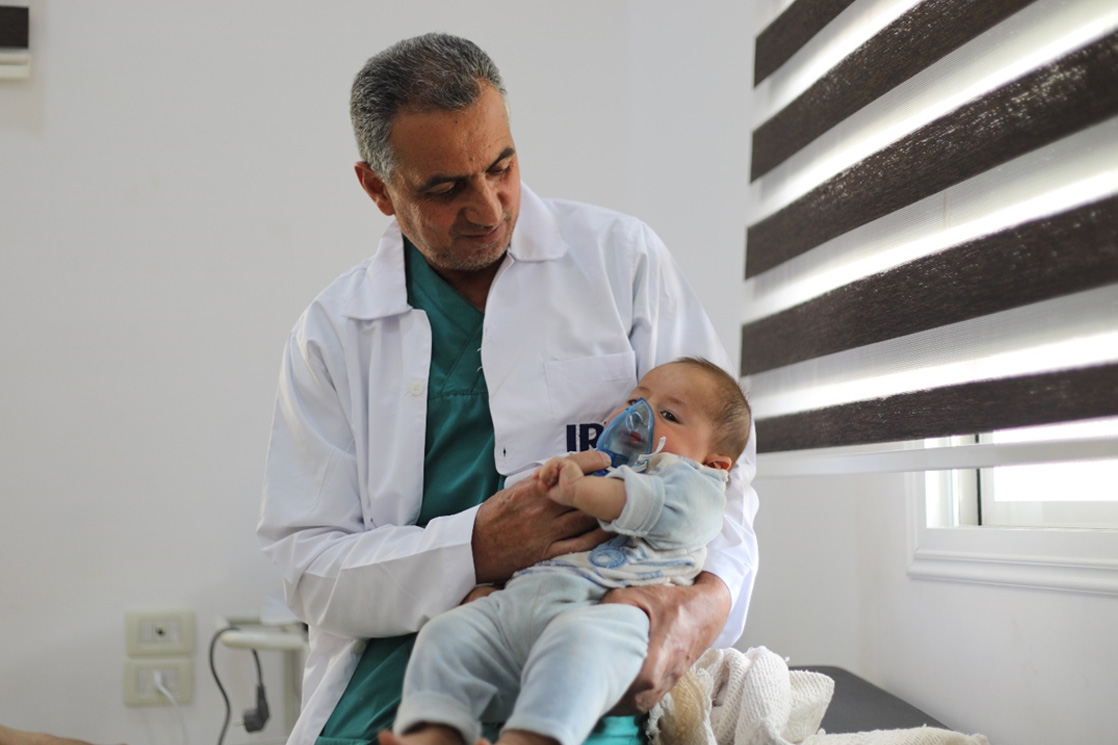 A paediatrician at the centre provides urgent care to an infant with respiratory distress. Photo credit: WHOAlongside physical health services, the centre now offers dedicated mental health and psychosocial support. Trained counsellors provide safe spaces for people to talk about their struggles – from children showing signs of trauma to parents overwhelmed by the challenges of displacement and return.
A paediatrician at the centre provides urgent care to an infant with respiratory distress. Photo credit: WHOAlongside physical health services, the centre now offers dedicated mental health and psychosocial support. Trained counsellors provide safe spaces for people to talk about their struggles – from children showing signs of trauma to parents overwhelmed by the challenges of displacement and return.
“People used to say mental health did not matter when you are trying to survive,” said one counsellor. “But now patients come to us and say: ‘I cannot sleep, I cannot stop worrying.’ They realize their minds need care too, not just their bodies.”
Strengthening systems for the future
The centre is also playing a role in protecting public health. By reporting weekly data through WHO’s Early Warning Alert and Response System (EWARS), it helps detect and respond to threats such as measles or cholera before they spread. This vigilance is vital in a region where outbreaks can quickly overwhelm fragile health systems.
Crucially, the centre has reduced reliance on mobile units by restoring a permanent, facility-based model, ensuring reliable access to care.
Partnerships driving recovery
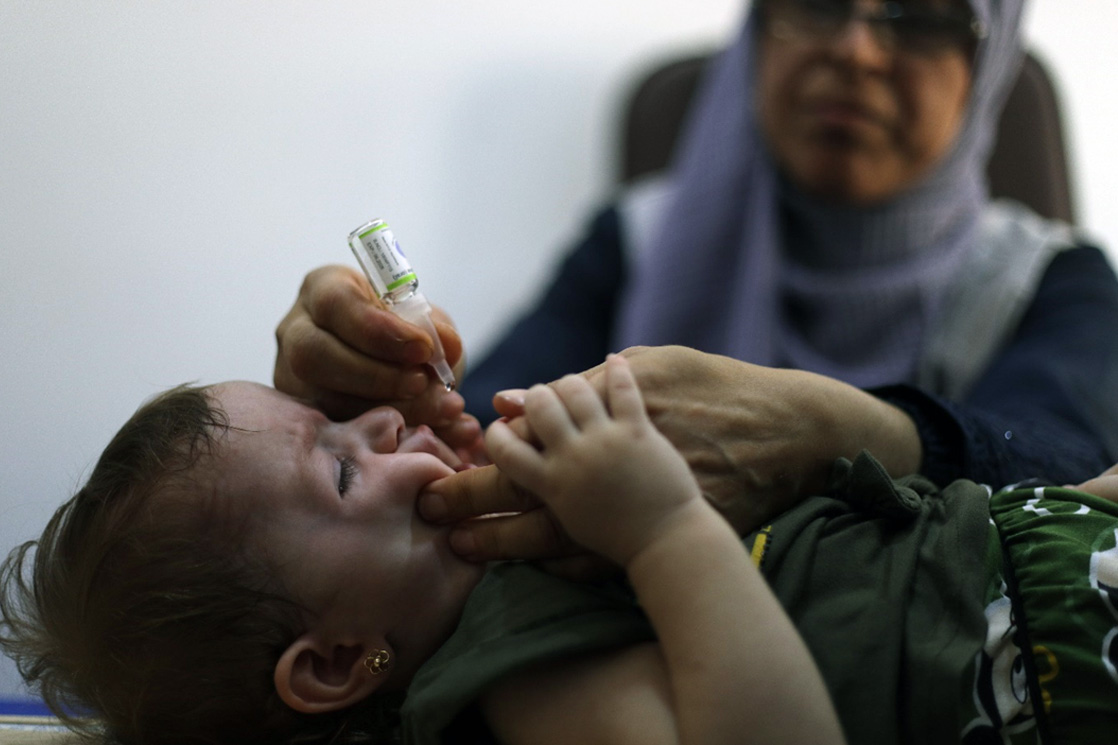 A health worker administers an oral vaccine to a young child at Ma’arrat An Nu’man PHC, which also has a dedicated EPI section. Photo credit: WHOThe rehabilitation of the Ma’arrat An Nu’man Primary Health Centre was made possible through support from Gavi, the Vaccine Alliance, working with WHO, the Ministry of Health and the District Health Directorate. Together they restored the physical infrastructure and anchored service delivery within national systems.
A health worker administers an oral vaccine to a young child at Ma’arrat An Nu’man PHC, which also has a dedicated EPI section. Photo credit: WHOThe rehabilitation of the Ma’arrat An Nu’man Primary Health Centre was made possible through support from Gavi, the Vaccine Alliance, working with WHO, the Ministry of Health and the District Health Directorate. Together they restored the physical infrastructure and anchored service delivery within national systems.
Operational costs are covered by the European Union (EU), through its Civil Protection and Humanitarian Aid Operations (ECHO), enabling WHO and Al Ameen to keep the centre fully functional. The center provides essential health care services, including outpatient consultations, normal and emergency obstetric, and ambulance services. Al Ameen, a WHO health partner, manages day-to-day operations, ensuring that care reaches families consistently and safely.
A sign of recovery
 Outside view of the centre, where families gather daily to access emergency, maternal, and child health services in a city where most infrastructure remains damaged. Photo credit: WHOFor families returning to Ma’arrat An Nu’man – a city where 90% of infrastructure remains damaged and no secondary care exists within 45 km – the centre’s revival has brought back a sense of stability.
Outside view of the centre, where families gather daily to access emergency, maternal, and child health services in a city where most infrastructure remains damaged. Photo credit: WHOFor families returning to Ma’arrat An Nu’man – a city where 90% of infrastructure remains damaged and no secondary care exists within 45 km – the centre’s revival has brought back a sense of stability.
“Every consultation here is a message to the community that they are not forgotten,” Dr Jaber reflected. “We are rebuilding trust, one patient at a time.”
In Aleppo’s northeast, Menbij hospital delivers lifeline care to over 23000 people
 Ali carries his 8-year-old son Abdelkarim through the crowded corridor of Menbij National Hospital after the boy received urgent care for a fracture. Photo credit: WHO
Ali carries his 8-year-old son Abdelkarim through the crowded corridor of Menbij National Hospital after the boy received urgent care for a fracture. Photo credit: WHO
17 September 2025, Aleppo, Syrian Arab Republic – When 8-year-old Abdelkarim Naasan fell while playing in his neighbourhood in Menbij, the pain in his leg left him unable to walk. His father carried him to Menbij National Hospital, the only hospital in the district. There, doctors quickly diagnosed a fracture and treated him with a cast. “The care was immediate and reassuring,” his father recalled. “We left the hospital confident that he would heal.”
For thousands of families in Menbij, a city in the north east of Aleppo Governorate, this hospital is the only place to turn for both emergencies and routine care. From trauma surgery to laboratory tests and blood transfusions, it provides essential services in an area where health care access is scarce.
 Dr Maqsoud Shankan, head of the laboratory at Menbij National Hospital examines test samples to ensure accurate diagnosis and treatment for patients. Photo credit: WHOWith funding from the European Union, through its Civil Protection and Humanitarian Aid Operations (ECHO), WHO and its partner Al-Ameen are ensuring that Menbij National Hospital remains open and equipped to serve people in need. The hospital provides medical consultations, emergency obstetric and dialysis services, as well as trauma and intensive care. In addition, WHO enhanced the hospital’s trauma capacity through the provision of mass casualty training for its staff.
Dr Maqsoud Shankan, head of the laboratory at Menbij National Hospital examines test samples to ensure accurate diagnosis and treatment for patients. Photo credit: WHOWith funding from the European Union, through its Civil Protection and Humanitarian Aid Operations (ECHO), WHO and its partner Al-Ameen are ensuring that Menbij National Hospital remains open and equipped to serve people in need. The hospital provides medical consultations, emergency obstetric and dialysis services, as well as trauma and intensive care. In addition, WHO enhanced the hospital’s trauma capacity through the provision of mass casualty training for its staff.
In recent months, more than 23000 people – including displaced families and host communities – received care through these facilities. The increase in patient visits reflects growing trust in the health system. Specialist services, including paediatrics and internal medicine, are seeing especially high demand.
Health workers emphasize how vital this support has been. Dr Maqsoud Shankan, head of the hospital’s laboratory, explained, “Every accurate test helps doctors give the right treatment. Without these services, patients would have to travel long distances or go without care.”
 Laboratory technician Abdel Salam Khalaf collects blood from a donor at Menbij National Hospital. Photo credit: WHOAt the blood bank, 28-year-old technician Abdel Salam Khalaf manages donations and urgent transfusions. “In an emergency, we cannot afford delays. Having the right equipment and supplies here in Menbij makes the difference between life and death.”
Laboratory technician Abdel Salam Khalaf collects blood from a donor at Menbij National Hospital. Photo credit: WHOAt the blood bank, 28-year-old technician Abdel Salam Khalaf manages donations and urgent transfusions. “In an emergency, we cannot afford delays. Having the right equipment and supplies here in Menbij makes the difference between life and death.”
To ensure the safety of patients and health workers, the hospital has also improved infection prevention and control. This includes practical measures such as providing staff with protective equipment, ensuring proper waste disposal, and setting up strict hand hygiene and sterilization routines. These steps reduce the risk of infections spreading within the hospital and give families greater confidence that they can seek care safely.
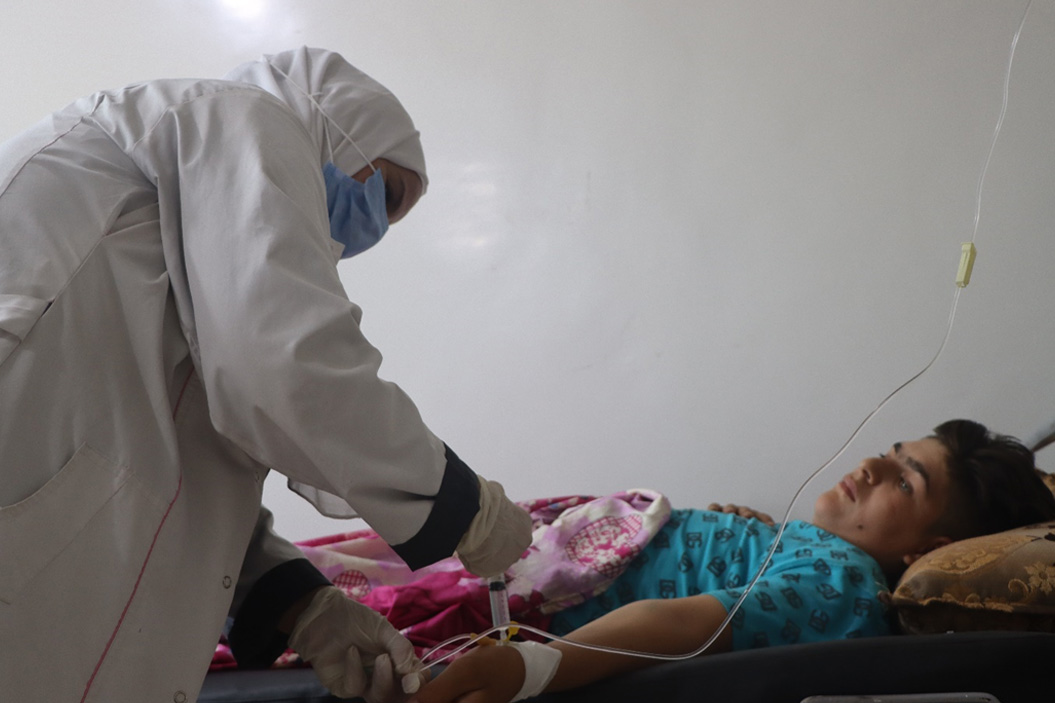 Abdelhadi Mousa receives post-operative care at Menbij National Hospital after undergoing gallbladder surgery. Photo credit: WHOFor patients like 22-year-old Abdelhadi Mousa, who underwent gallbladder surgery at Menbij National Hospital, this investment is life-changing. “I lived with pain for so long,” he said. “Now, after the operation, I can begin again.”
Abdelhadi Mousa receives post-operative care at Menbij National Hospital after undergoing gallbladder surgery. Photo credit: WHOFor patients like 22-year-old Abdelhadi Mousa, who underwent gallbladder surgery at Menbij National Hospital, this investment is life-changing. “I lived with pain for so long,” he said. “Now, after the operation, I can begin again.”
In a district where health facilities are few and challenges remain high, Menbij National Hospital stands as a lifeline. Continued support from the European Union ensures that these services remain available, sustaining care today while laying the foundation for stronger, safer health systems in the future.
Empowering communities, saving lives: Syria’s caring for newborns and mothers at home programme
 17 September 2025, Syrian Arab Republic – Born in the sixth month of pregnancy, in a region where access to neonatal care is limited, and weighing just 900 grams, Lena’s* survival was far from certain. But thanks to the medical and home care guidance provided by volunteers trained through a programme supported by the World Health Organization (WHO) and Syrian Ministry of Health – and the tireless commitment of her parents – Lena began to thrive.
17 September 2025, Syrian Arab Republic – Born in the sixth month of pregnancy, in a region where access to neonatal care is limited, and weighing just 900 grams, Lena’s* survival was far from certain. But thanks to the medical and home care guidance provided by volunteers trained through a programme supported by the World Health Organization (WHO) and Syrian Ministry of Health – and the tireless commitment of her parents – Lena began to thrive.
That Lena is now a healthy 2-year-old testifies to the strength of her family and the lifesaving impact of home-based care. Supported by volunteer community health workers, who provided advice and close follow-up, her parents followed best practices: frequent breastfeeding, skin-to-skin warming, and avoiding supplements and formula. It was a collective effort, rooted in community-based care.
Lena’s family is one of many that have benefitted from the caring for newborns and mothers at home programme. Linked to the healthy village programme, the initiative involves volunteer health workers providing essential care to pregnant women and newborns.
As part of the programme, community health workers conduct home visits during the antenatal period and the first weeks after birth. They support families in adopting best practices for maternal and newborn care at home, while encouraging care seeking from specialist health professionals when needed.
 Launched in 2017, the programme reaches around 20 000 families annually in underserved rural areas, in coordination with the Ministry of Health. The programme's success is largely due to the dedication of its volunteers who receive 5 days of basic health care training.
Launched in 2017, the programme reaches around 20 000 families annually in underserved rural areas, in coordination with the Ministry of Health. The programme's success is largely due to the dedication of its volunteers who receive 5 days of basic health care training.
In 2024, 19 180 home visits were made, with 58 newborns and 69 mothers referred to specialized care. The programme is currently implemented in 11 governorates, where a total of 885 volunteers cover 216 healthy villages.
Despite the successes, the programme covers just 5% of Syria’s prenatal, delivery and newborn care needs. Funding remains a significant hurdle to the programme’s sustainability and expansion. Resources are limited and access to some hard-to-reach areas across the country continues to be a challenge.
The future
The goal is to build on the programme’s successes and expand its reach. With a renewed focus on quality and training, the programme aims to engage volunteers with higher education – currently volunteers are mostly from preparatory and high school backgrounds – and enhance capacity-building opportunities, including a shift to computerized data collection.
As the caring for newborns and mothers at home programme moves forward, it is poised to make an even greater impact. It will continue to empower communities and save lives as Syria works to rebuild its health system and secure a healthy future for all its mothers and children.
* Name changed.
EU support to medical supply chains keeps hospitals and clinics running in Syria
 Majd Qolghasi, Warehouse Officer with Hand in Hand for Aid and Development, checks EU-funded medical supplies at the WHO-managed warehouse in Sarmada, Idlib. Photo credit: WHO16 September 2025, Idlib, Syrian Arab Republic – In a warehouse in Sarmada, boxes of medicines and surgical kits are stacked neatly on pallets, ready to be dispatched to health facilities across Syria. For Majd Qolghasi, Warehouse Officer with Hand in Hand for Aid and Development, the health partner managing WHO’s warehouse in Idlib, each shipment represents more than supplies – it is a lifeline for patients.
Majd Qolghasi, Warehouse Officer with Hand in Hand for Aid and Development, checks EU-funded medical supplies at the WHO-managed warehouse in Sarmada, Idlib. Photo credit: WHO16 September 2025, Idlib, Syrian Arab Republic – In a warehouse in Sarmada, boxes of medicines and surgical kits are stacked neatly on pallets, ready to be dispatched to health facilities across Syria. For Majd Qolghasi, Warehouse Officer with Hand in Hand for Aid and Development, the health partner managing WHO’s warehouse in Idlib, each shipment represents more than supplies – it is a lifeline for patients.
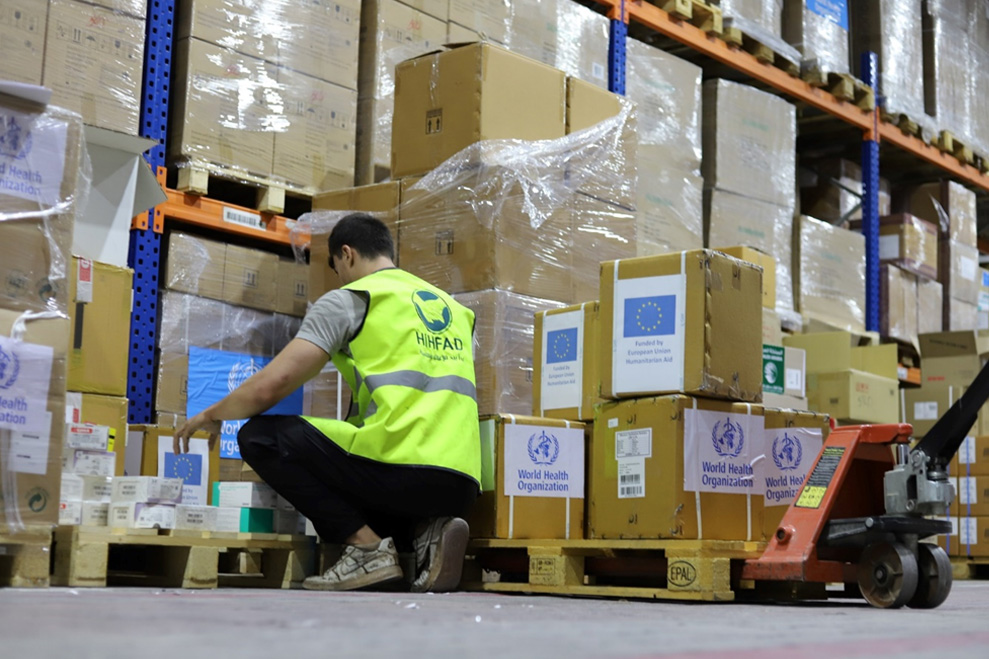 Warehouse staff organize EU-funded medical supplies at WHO’s warehouse in Sarmada, Idlib, before dispatch to health facilities. Photo credit: WHO “This shipment comes in response to the growing needs of the health sector,” says Majd. “It will significantly support hospitals and health centres by strengthening their capacity to provide medical services to patients – especially under the difficult circumstances the sector is facing, with limited resources and funding.”
Warehouse staff organize EU-funded medical supplies at WHO’s warehouse in Sarmada, Idlib, before dispatch to health facilities. Photo credit: WHO “This shipment comes in response to the growing needs of the health sector,” says Majd. “It will significantly support hospitals and health centres by strengthening their capacity to provide medical services to patients – especially under the difficult circumstances the sector is facing, with limited resources and funding.”
The most recent consignment, delivered with support from the European Union (EU) through its Civil Protection and Humanitarian Aid Operations (ECHO), included essential medicines, medical consumables and surgical supplies. Distribution is carried out through a carefully planned system in coordination with the local Health Directorate under the leadership of the Ministry of Health, ensuring that health partners operating in Idlib and Aleppo can serve the people most in need.
Air bridge to Syria’s health facilities
This is not the first time EU support has sustained Syria’s fragile supply chain. In December 2024, more than 50 tonnes of EU-funded medicines and supplies were flown to Türkiye through the EU Humanitarian Air Bridge and transported by WHO to overstretched health facilities in Idlib and Aleppo. The delivery arrived at a pivotal moment as the country entered a transitional phase, helping facilities restock amid persistent needs.
Meeting emergencies head-on
From routine care to crisis response, timely supplies are vital to keep Syria’s health system functioning.
“These shipments help ensure the continuity of life-saving services for both chronic conditions and emergencies,” Majd explains. “Hospitals, health centres and mobile medical units are better supported, easing the pressure on facilities and enabling medical teams to provide immediate and continuous care.”
 EU-funded medical supplies are loaded for delivery from WHO’s warehouse in Idlib to hospitals and clinics. Photo credit: WHO Following the recent blasts in Idlib in July this year, WHO responded within 24 hours in coordination with the Health Directorate and partners – delivering 24 trauma kits to support emergency medical care. Each kit includes essential drugs, anaesthesia supplies, transfusion materials, dressing sets and surgical tools – enough to support more than 200 surgical procedures.
EU-funded medical supplies are loaded for delivery from WHO’s warehouse in Idlib to hospitals and clinics. Photo credit: WHO Following the recent blasts in Idlib in July this year, WHO responded within 24 hours in coordination with the Health Directorate and partners – delivering 24 trauma kits to support emergency medical care. Each kit includes essential drugs, anaesthesia supplies, transfusion materials, dressing sets and surgical tools – enough to support more than 200 surgical procedures.
Majd recalls the impact clearly: “We had the trauma kits ready in the warehouse. When the blasts happened, the needs were identified by health authorities and partners, and we were able to send them immediately. That speed saved lives.”
This was also evident during the devastating wildfires in Lattakia earlier this summer. WHO delivered eight Trauma and Emergency Surgery Kits for burn care from its Idlib warehouse. Four kits were provided to Lattakia’s National and University Hospitals to treat people with severe burns, while another four were pre-positioned as contingency stock for future needs. Each kit contained supplies to manage 50 burn cases – helping health workers save lives when every minute counts.
Strengthening emergency response and continuity of care
Since 2011, Syria’s health system has been tested by conflict, economic crisis and multiple emergencies. EU support has been a cornerstone in strengthening resilience.
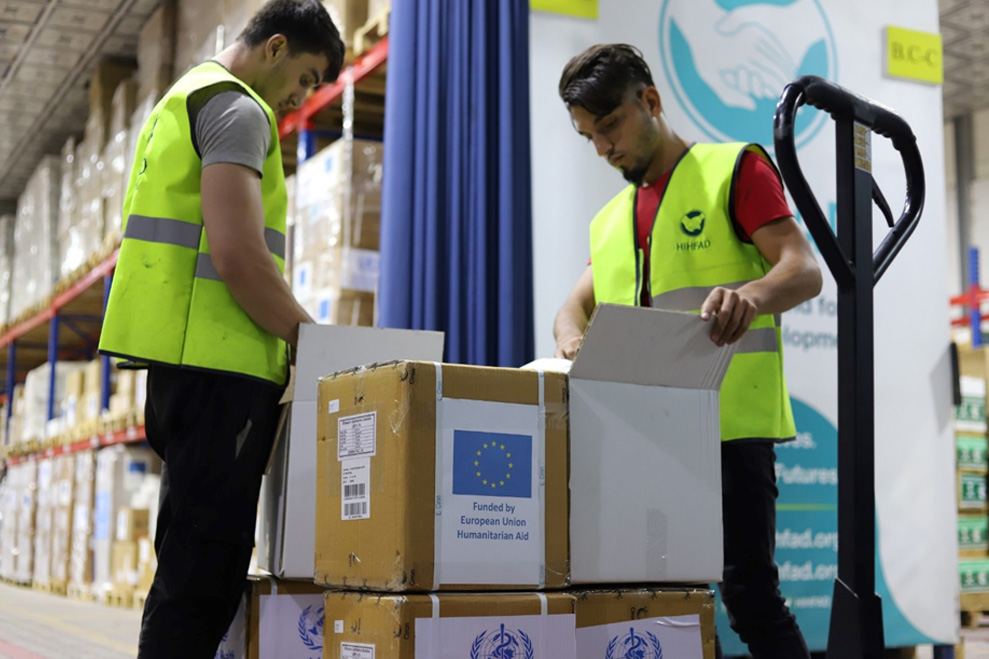 Health partner staff prepare EU-funded medical consignments at WHO’s warehouse in Sarmada ensuring medicines and supplies reach facilities on time. Photo credit: WHO Since last year, the European Union (EU), through its Civil Protection and Humanitarian Aid Operations (ECHO) has provided around €10.4 million to WHO across Syria, supporting ambulances, referral systems, essential medicines, primary health care, trauma services and more. Of this, over €4.1 million has gone towards medical procurement, ensuring essential medicines and supplies reached over 1 million people in need.
Health partner staff prepare EU-funded medical consignments at WHO’s warehouse in Sarmada ensuring medicines and supplies reach facilities on time. Photo credit: WHO Since last year, the European Union (EU), through its Civil Protection and Humanitarian Aid Operations (ECHO) has provided around €10.4 million to WHO across Syria, supporting ambulances, referral systems, essential medicines, primary health care, trauma services and more. Of this, over €4.1 million has gone towards medical procurement, ensuring essential medicines and supplies reached over 1 million people in need.
A new EU commitment of €22 million will sustain life-saving and life-sustaining health services for more than 6.5 million people into next year – keeping hospitals, clinics, referral pathways and medical supply chains running as the country begins its transition to recovery and rebuilding, while still maintaining critical humanitarian services.
“For us, every box in this warehouse means hope,” says Majd. “Thanks to the EU’s support, we can move quickly when emergencies happen and keep services running for the people who depend on them. That is what makes the difference.”








